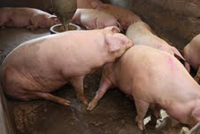
Antibiotics in Pig Farming: How We Poisoned Ourselves

Pigs in China
On March 15, 2011, World Consumer Rights Day, the clenbuterol pork scandal was exposed in China and shocked meat-lovers with this health-threatening “lean meat powder” used to make animals grow muscle rather than fat. But in addition to being directly consumed, chemical residues from the livestock industry can affect our health via more diverse and complicated pathways.
We know that frequent use of antibiotics to treat bacterial infections can lead to resistance, to such an extent that the drug is no longer effective. Recently, research published in the Proceedings of the National Academy of Sciences (PNAS) journal revealed that, antibiotics and heavy metals fed to pigs have significantly raised the level of antibiotic resistant microbes in the animals’ manure, manure compost, and soil. Today, China is the largest producer and consumer of antibiotics, with major buyers from the livestock industry. In large- and middle-scale factory farms, antibiotics and metal feed additives are applied frequently and at high doses for growth promotion and disease control.
The study showed that with 149 unique antibiotic resistance genes (ARGs) detected in sampled farms, the level of enriched ARGs can reach up to 28,000-fold for manure samples, and 1,000-fold for soil samples, compared with manure and pristine soil from animals not treated with antibiotics.
Furthermore, with both antibiotics and metals such as zinc, copper and arsenic present, ARGs can persist longer during manure treatment procedures, allowing the genes to be transferred among different bacterial communities. In other words, the environment, a reservoir already of a huge variety and amount of ARGs, may now face a higher probability of nurturing multi-resistant bacteria.
Drug resistance will return and has the potential to spurn a health crisis. Are we going to fight against it with more advanced medical weapons? We will certainly do so, if equipped with science and technology. But this war seems to be a vicious cycle. Rather than defending ourselves, we have been fighting against ourselves by ignoring the connection between our actions and the rest of the planet.
The unity of human and nature is at the core of traditional Chinese philosophy. Textbooks for high school students in China (and elsewhere) should include Mencius’ view of a harmonious society from more than 2,200 years ago, with an example of nature-conforming husbandry. Additionally, in the 14th century, Liu Ji explained his model of sustainability as “human, the thief of natural resources” – meaning, we must borrow from nature without disrupting its life cycle in order to live sustainably and to “master in such theft”(the Chinese pronunciation coincidently resembles the English pronunciation of ‘sustain’).
Philosophers have shared their wisdom, which was once overlooked by the belief in absolute human power. For decades, people applied the tools of science and technology to exploit nature for “our own benefit”, but forgot to examine these approaches with sufficient understanding of the whole natural system. Now, the same science and technology has revealed, or rather confirmed, the consequences of over-exploitation. “Our own benefit” does not exist if our food and the environment are contaminated with poisonous chemicals.
To reverse the situation, there are still many aspects we can work on. Implementing regulations regarding feed additives and drug use and manure management/disposal (especially for intensified factory farms) can help reduce the regeneration and spread of ARGs. More critically, reducing overall meat consumption, enhancing environmental education (in both urban and rural areas), as well as integrating sustainable thinking in policy-making can bring real hope for our future.
Photo courtesy of Xie Zheng
 Brighter Green
Brighter Green



